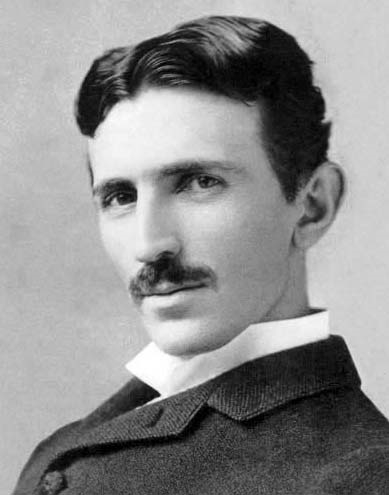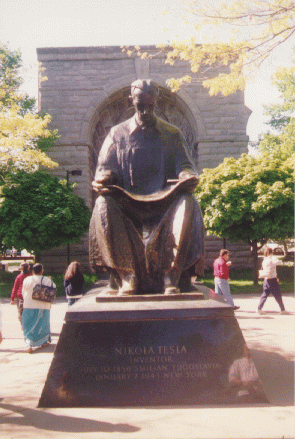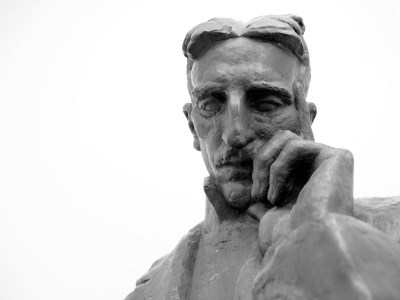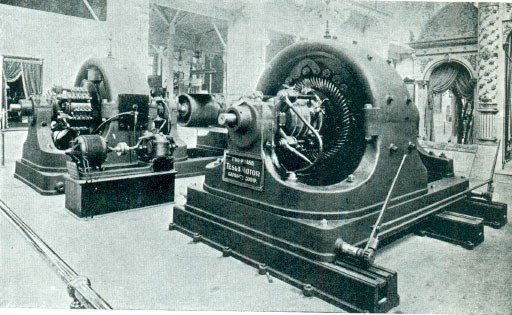 |
| Nikola Tesla (http://upload.wikimedia.org/wikipedia/commons/5/56/Tesla3.jpg ()) |
It is 1893, and the place is Chicago. The World Fair is being set up, and throngs of excited people pace back and forth, murmuring at an enormous set of generators placed before them. The enormous metal wheel-like machines can generate the energy of a thousand horses, using the alternating-current method created in part by the man standing beside his machines. He flips a switch, and the contraptions burst into life. The crowd gasps and chatters excitedly as electricity thrums through the air and the generators crackle with sparks and light. The man behind all this, the one who spent countless hours designing and building these machines, is none other than Nikola Tesla, Serbian inventor and engineer. Tesla, born in 1856 in Croatia, displayed a thirst for knowledge and building, even as a young child: "(His parents) provided access to continued and advanced education. . .A dedicated reader, Tesla's father owned a huge library. . . . (Tesla) credited his mother with stirring his interest in creating things. Both her father and grandfather had invented as a hobby, and (Mrs.) Tesla created tools to make her life easier around the house. . ." (Burgan). Education was valued highly during Tesla's childhood, leading to his career as an inventor and engineer in both Europe and America. Tesla went to work for Thomas Edison in 1882; however, because of his dislike for Edison Tesla left the company to strike out on his own. Throughout his life, Tesla gathered hundreds of patents and prizes up until his death in 1943 due to heart failure. Over the course of his career, Tesla is credited with having invented many machines and theories. Besides these accomplishments, he also demonstrated the qualities of a hero in his selfless devotion to learning and science. Nikola Tesla, in the early ages of technological engineering and in a time when fire and coal supplied the world's power needs, was able to contribute both his inventions and ideas in the area of electrical engineering, helped by his modesty and humility in regards to his work, his good work ethic and his dedication to making the world a better place.
 |
| Monument of Tesla at Niagara Falls. (http://www.neuronet.pitt.edu/~bogdan/tesla/images/statue1.gif ()) |
Nikola Tesla revolutionized the coal-based world of engineering and power sources through his research and contributions in the field of electrical engineering. Credited with hundreds of patents, Tesla placed his name and ideas in not only electrical engineering, but also in lights, power, radio, and many other fields: "He produced in rapid succession the induction motor (utilizing his rotating magnetic field principle) and other electrical motors, new forms of generators and transformers, and a system for alternating-current power transmission; later he invented the Tesla coil and made basic discoveries concerning wireless communication. Tesla also invented fluorescent lights and a new type of steam turbine, and he became increasingly intrigued with the wireless transmission of power" ("Nikola Tesla"). It is a remarkable feat to be able to excel in one area of research, let alone multiple; Tesla managed to make his mark on many fields that were of great importance during his day. Naturally, someone who had such a huge effect on the world of inventions would have positively benefited many areas of our life today. Not only were his inventions and theories many in number, but they were also "in rapid succession", a factor of a quick-thinking and educated mind. Throughout history, a mark of a great inventor or thinker is the ability to do their jobs not only well, but quickly. The fact that Tesla was able to create such a wide range of accomplishments proves that he had this ability to work well and fast. In addition to the many discoveries made by Tesla during his time on the Earth as an inventor and engineer, he also expressed that he could have done more had the world at the time been more advanced; indeed, this just goes to show that his work's impact stood the test of time: "My project was retarded by laws of nature. The world was not prepared for it. It was too far ahead of time, but the same laws will prevail in the end..." (Tesla). Tesla remains confident in his autobiography that the things he tried to create would come to pass in the future as soon as the world was "prepared". No doubt this adamancy in the success of his inventions drew from his many accomplishments that had benefited and continued to benefit the world during his lifetime. As shown by his statement, Tesla clearly believed that his works would benefit others in the future and help open the door for even greater accomplishments. Only a foundation in knowing one's work was successful and would stand the great test of time could create this belief; only one who had benefited society greatly could be so sure of the fact that they and their work would continue to do so. Certain of the fact that he had benefited society with his hundreds of inventions and theories, Tesla predicted that his work would continue to do so; a logical conclusion from the simple fact that Nikola Tesla's broad range of research and success has been proven by the patents and discoveries he made.
 |
| Statue of Tesla (http://www.safetyservicescompany.com/blog/wp-content/uploads/2010/09/NikolaTeslaStatue.jpg ()) |
Despite his accomplishments and great knowledge, Tesla proved he was more concerned with furthering his inventions and theories than fostering his own personal glory in both his refusal of renowned prizes and his reaction to compliments. It is the mark of a truly humble man to be able to refuse both glory and accolades--certainly it would validate a person's own modesty in regards to furthering their own work, as Tesla did so concerning when offered both highly acclaimed awards: "He refused to accept the 1912 Nobel Prize offered jointly to him and Edison and reluctantly accepted the Edison Medal of the American Institute of Electrical Engineers in 1917" ("Nikola Tesla") The Nobel Prize, one of the most prestigious prizes offered to any expert in their chosen field, serves as both a motivator and reward to many people seeking it. It takes a great deal of humility, however, to not accept it, as it shows it was not the thought of prizes and fame motivating Tesla. Tesla, in his refusal and reluctance toward both prizes, demonstrates both modesty and humility in that he was unwilling to seek fame or personal glory to further his own pride or ego, rather than focusing on his work. When offered what many would regard the opportunity of a lifetime, Tesla chose to decline because he was not interested in personal honor or prizes. Besides being offered prizes and medals, Tesla was also acknowledged by "great men" of his intelligence and contributions to the scientific world: "Ever since I was told by some of the greatest men of the time, leaders in science whose names are immortal, that I am possessed of an unusual mind, I bent all my thinking faculties on the solution of great problems regardless of sacrifice" (Tesla) As Tesla states, he continued to work "regardless of sacrifice"; he decided to hold nothing back in trying to solve "great problems". This shows his dedication to the scientific dilemmas of the world, rather than a vanity or fear of damaging his reputation in devoting his entire life toward science. Additionally, there are many who would become arrogant or conceited if praised for their intelligence by "the greatest men of the time". Tesla, however, responded to such acclamations by choosing to take such words as a motivation to work ever harder in helping the world. Even as others and even himself endorsed Tesla's contributions to the world of engineering, Nikola Tesla only took these as an inspiration to work harder and help others, not as a reason to become sure of himself or seek fame; he cared more for his vocation and the problems of the world than for his reputation or personal glory.
The qualities of a hard worker, such as determination and a strong work ethic, are often signs of one destined to become great; they show a desire to help others regardless to the cost of one's own well-being. Even as a child, Nikola Tesla persevered to learn as he much as he could and to become self-reliant and mentally strong: "(My father) hid the candles when he found that I was reading in secret. He did not want me to spoil my eyes. But I obtained tallow, made the wicking and cast the sticks into tin forms...and read, often till dawn...(the book 'Aofi') somehow awakened my dormant powers of will and I began to practice self-control. At first my resolutions faded like snow in April, but in a little while I conquered my weakness and I felt a pleasure I never knew before--that of doing as I willed" (Tesla). While many of those regarded as heroes did not hold the qualities they gained later in life as youth, Tesla proved to be an exception as he honed the qualities of hard work and determination as a young child. Even as he was beginning to learn about the world and develop his character, Tesla demonstrated his desire to push himself and work harder by gaining the qualities of a hero as soon as possible. While it would have been easy to be daunted by the prospect of teaching oneself the concepts of will and self-control at a young age, Tesla showed not only determination in trying to achieve these lofty goals, but also in succeeding at them. His determination to work hard, to learn, and to let his own will win no doubt served him later in life as he worked tirelessly at his inventions. Like everyone, Tesla had to die; however, he did not succumb to old age or illness--he fell to the work he'd made so many successes and achievements in, as a result of his hard work in regards to his inventions: "It was later discovered that Tesla had died between the evening of January 5 and the morning of January 8, the constant effect of electricity upon his body having finally caused his heart to fail" (Meyers). Like Marie Curie, who died from her continued exposure to radiation, Tesla died from his exposure to constant electricity, the main focus of his work and research. Only a true devotion to his work in electricity could have meant he would spend so much time with it that his heart would give out; only working so hard at perfecting his electrical theories and inventions would cause his heart to eventually fail from the effects. While Tesla may have felt the negative effects of the electricity on his body or perhaps heard of the dangers of being exposed to so much electrical power, he died from these effects, showing his desire to work hard at his inventions and theories was stronger than his desires for good health or relief from the pain of his heart. Throughout his life, in youth and near his death, Tesla demonstrated a desire to work ever harder through his determination to learn and benefit society.
 |
| Tesla's Chicago World Fair Motors (http://upload.wikimedia.org/wikipedia/commons/e/e1/Tesla_polyphase_AC_500hp_generator_at_1893_exposition.jpg ()) |
As the man steps back, the machines' whirs slow to a halt and quiet. The lights dim, and the throng disperses.What remains, however, are the machines themselves, and the electrical spark around them. Nikola Tesla's work remains behind him to attest to what he has done, and who he is. As Tesla said in his autobiography, "...the same laws will prevail in the end..." (Tesla). True to his prediction, after his death his work and contributions to the world truly shine both in inspiration and in improving people's lives. Only through Tesla's humility and hard work did this come to pass. "Tesla was one of those rare individuals whose contributions to society defy any attempt at summary. He acquired more than 700 patents both in the United States and in Europe on a wide variety of topics" (Meyers). Because of Tesla's many inventions and ideas, the world has come to be a better, more advanced place. Perhaps his greatest legacy, however, is his demonstration that hard work and dedication as a youth pay off, and that the best heroes take humility in their work and create and invent and help solely for the joy of making the world a better place. Tesla is a true hero because he inspires me and others to work harder, to be dedicated to our work, and to constantly seek after knowledge. Tesla proves that a true hero is someone too bright to be dimmed by the dark curtains of time and history; a true hero's spark remains to inspire others forever.
Works Cited
Burgan, Michael. Nikola Tesla: Physicist, Inventor, Electrical Engineer. Mankato: Compass
Point Books, 2009.
Meyers, Julia M. "Nikola Tesla". Nikola Tesla (2006): 1. Biography Reference Center. Web.
21 Mar. 2012.
Meyers, Julia M. "Nikola Tesla". Great Lives From History: Inventors and Inventions
(2008): 1. Biography Reference Center. Web. 21 Mar. 2012.
"Nikola Tesla". Encyclopedia of World Biography. Detroit, Gale, 1998. Gale Biography in
Context.
Web. 21 Mar. 2012.
Tesla, Nikola. My Inventions. New York: Hart Brothers,
1982.
Page created on 4/19/2012 12:00:00 AM
Last edited 4/19/2012 12:00:00 AM
